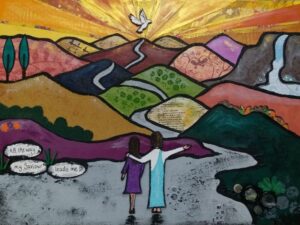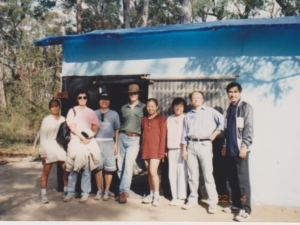
Cross Over to the Other Side
For Christians, the word ‘cross’ symbolises the centrepiece of our faith. However, it is also a verb which denotes an action, a definite and deliberate

Mark is the GLO Europe Training Director and coordinator in the Enable Training Forum. He and his wife Shirley now live and serve in London, based at Highgate International Church. Previously (1983-2004) they, along with their five children, lived in Zambia, engaged in Bible teaching, church planting and social care projects.
Getting excited about the different ethnic folk filling your supermarket? Positive about cultural differences? Or are we happier with our own folk?
Among the powerful visions that the Apostle John sees, regarding God’s purposes for creation, is the truth that no people group will be missing in those final days. Five times the phrase ‘every people, tribe, language and nation’ is used covering the deception and rebellion of the human race (Rev. 11:9 and 13:7), the widespread proclamation of the Gospel (14:6), as well as the clear statement of the redemptive purposes of Christ (5:9) and the certainty of its outcome (7:9).
This ties in perfectly with Christ’s commission to us directed through the first ‘sent ones’ (apostles) “… make disciples of all nations” (Matt. 28:19). And I have intentionally left off the geographically directive verb ‘Go’, because the challenge is that, whether we go, stay or come, our life’s objective should be to facilitate people of all groups and cultures in the pathway of following Jesus Christ.
The natural selfishness of the fallen heart, even among the best of God’s people, tends to focus inwards, and the habits of life (culture) we develop generate a sense of security and stability in sticking with our own. Added to that, the early church (all Jewish believers) had a familiar history which evidenced God’s special calling of them as a nation to be his people.
While the old covenant clearly was orientated ultimately for the blessing of all nations (Gen. 12 plus Isa. 42), it took a while for the even the Apostles to get their heads around embracing all nations into the church. It wasn’t just the theological mind-shift needed, but also the practical changes required in life style. A kosher-meat-only fisherman has to handle a Roman Centurion’s household menu – and for that, the Lord had to ‘triple up’ a vision which contained a fairly large over-statement about the things that God considers to be clean! (Acts 10)
And now the world has all come to us, rather than there being any necessity to travel!
When my wife, family and I returned from 20 years of missionary service in Zambia, it was to the GLO Centre and Tilsley College in Motherwell – which at that time was a town in which seeing a different coloured face was a rarity. Within a year, the town Council welcomed around 70 families from Congo (DRC) as part of an official refugee resettlement programme. This, along with other more recent migrations, has led to a significant street-level visual change to what was a very mono-cultural Lanarkshire community.
While the old covenant clearly was orientated ultimately for the blessing of all nations, it took a while for the even the Apostles to get their heads around embracing all nations into the church
Mark Davies, GLO Europe Training Director Tweet
Interestingly, the local Council sought and received help from local churches to welcome the refugees and help settle them, as it was quickly realised that the vast majority of incomers were practising Christians who naturally looked for church fellowship wherever they went. Amazingly one of the families were from the same group of evangelical churches (Brethren-related) that we had worked with in Zambia – and we spoke a common Zambian/Congolese language. So we ended up using Cibemba on the streets of Motherwell! One of the guys we helped welcome was a Methodist pastor who, on completing an additional college course, qualified to serve in a Methodist church further south. Another brother functions as an independent evangelist and disciple-maker in Motherwell, and who in his way has sought not to create an African church but to reach out to the indigenous (Lanarkshire) folk.
About the same time the local FE college had a concerted effort to recruit cohorts of Chinese students as part of their expansion plans. Building friendships and running an International Café in the local town provided the opportunity for a number to meet practicing Christians for the first time, to experience as well as hear the message of God’s love expressed to people of all nations in Christ Jesus.
Our increasingly multi-cultural society in UK is a blend of both opportunities to reach people groups we have never imagined we could touch, as well as providing workers to help us reach our own people more effectively.
How positive are you about people who are different from you? Are you excited about multi-cultural relationships as God is?
Have you carried out any recent research on the demographics in your local community? What changes are taking place?
Who are the new groupings of people you can now reach for Christ? Who are the new workers (fellow believers) that the Lord has brought to you?

For Christians, the word ‘cross’ symbolises the centrepiece of our faith. However, it is also a verb which denotes an action, a definite and deliberate

“Why not try to paint a picture based on your favourite hymn?” There are many hymns I love, so it’s always hard to choose a

I was raised in a Christian family and was 12 when the Lord called my parents to missionary service. Seeing other countries and cultures was

“You’re not Irish!” he said with a derogatory smile on his face. I was confused, because I thought I was. Some might quip that it

What playlist have you planned to use this summer and what’s it called? Nowadays many of us use playlists on our phones or tablets to

Some words can provoke a reaction. I have sometimes spiced up a conversation with friends by dropping in a word that I know will be

What do you think is the greatest challenge for missionaries? Apparently it’s not necessarily the uncomfortable climate, the unfamiliar diet, the difficulties of language, the

Interesting times we live in! Even if you were alive for the last global pandemic, none of us have experienced anything like this before. The

In this blog, let us think about how our strategies in mission compare with the early church in Acts. Here are two passages from Acts which

Standing one evening with my grandson, who was three years old at the time, we were gazing into the dark night sky. Trying to be

God’s call to us was progressive, slow and measured. Probably, in my case, it started when I was born to missionary parents who came from

Coronavirus: the word on everyone’s lips and the fear in (almost) everyone’s hearts. Response to the pandemic has been mixed. We cannot fail to be

With every job description comes information about the task at hand: what have I to do? Who do I report to? What resources are available

What does it mean to waste life? This is a burning question that all human beings need to face as individuals. Many are wasting the

Being a missionary is not an occupation that many young people would consider these days. When I started as a missionary, there was no salary,

It was toward the end of 1989 when the Lord stopped me in my tracks. For years I had heard the gospel through a Christian

In Acts 8:26-35, we eavesdrop as Philip shares the Message of Jesus with a fellow-traveller. 1) Listening to God (8:26, 29) Philip was a person open

In my first blog I mentioned how important Christian camps have been to us as a family and especially to our two boys Josiah and Joseph.

What should our strategy for mission be?That’s a question many books and articles seek to grapple with. But whilst a lot of these strategies are

These were the remarkable words that Jesus said to his disciples. They’d seen that the crowd who were there to listen to Jesus were in
If you would like to receive information about our next events feel free to sign up to our mailing list.
© Copyright 2019 GLO Europe. All Rights Reserved | GLO-Europe is a charitable Trust based at 78 Muir Street, Motherwell, ML1 1BN.